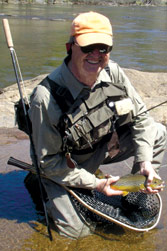About five years ago, I was doing a renovation job at Western Carolina University in Cullowhee. During the four months I was there, a passionate debate was playing out in the local paper via articles, editorials and letters to the editor.

A group of out-of-town fly-fishing enthusiasts had bought about a half-mile of frontage on the Tuckaseegee River, aiming to create a high-dollar fly-fishing destination featuring guides, a lodge, a private waterfront on a fine river — and big fish. These same folks began a public lobbying campaign to turn the Tuckaseegee into an exclusively catch-and-release river, hoping to attract a new conservation-minded fishing public — and guarantee their clients big fish.
There are various examples of places that have, via grass-roots mandate, converted harvestable waters to catch and release. About 25 years ago, the people of Montana voted in a five-year moratorium on harvesting fish, to increase and stabilize wild trout populations while generating larger fish for future generations to harvest in a more responsible manner.
And certain sections of the San Juan River in northern New Mexico boast enormous numbers of big, BIG trout, making these spots popular destinations for catch-and-release fly-fishing enthusiasts. Under local law, current license holders can take a fish a day on a fly, but once you've kept one, you must dismantle your rod or risk a hefty fine. This ethic has created lots of large (albeit hard-to-catch) trout.
So there are good reasons for turning harvestable waters into catch-and-release waters, and there are many places where such mandates by the people have been successful.
But because of its high water volume, the Tuckaseegee has been heavily stocked by the state for decades, for the express purpose of allowing people to catch those fish. And for generations, folks out that way have been taking their full limit of trout from the Tuck to the frying pan or freezer. At the grass-roots level, these locals said, "We like our fishing just the way it is, and we don't want to stop catching the trout the state stocks for our enjoyment."
Both sides produced articulate arguments in the local paper. The locals maintained that being able to catch fish whatever way they wanted was their birthright, and a bunch of rich out-of-towners had no right to tell them they needed to change. Meanwhile, the "fishing lodge" crowd struck an evangelical note, admonishing the locals to embrace a fishing ethic more in keeping with their own, for everyone's benefit. But the locals would have none of it, and the last I heard, the battle was still raging.
I bring this up because a couple of readers of this column have questioned the reasoning behind the catch-and-release ethic, which I've mentioned in other articles. Lee Wulff, the warrior god of modern fly-fishing, single-handedly introduced the concept when he went on record declaring, "A game fish is too valuable and too precious to be caught only once" — and proceeded to release every fish he caught, regardless of size, for the rest of his life.
Far be it from me to take issue with folks who want to keep their legal catch. But I choose to subscribe to the catch-and-release ethic because it's the law on wild trout waters in North Carolina and because, once a heartfelt ethic is embraced, it's difficult to turn it off.
It's sort of like committing to organic gardening: That means you garden organically, period. For me, it's the same thing with catch and release. Besides, in my world, fly-fishing isn't necessarily about catching fish, though that is the goal, and it definitely isn't about the size of the fish, although big ones are more fun to catch.
The way I see it, a clean release means I don't need to hold the fish to consider it "caught." If I can bring a fish in to the point where I have the tippet in my hand, then in my view, I've caught it.
And once I've reached that stage, I find that barbless hooks will often come out on their own if the line pressure is released. This makes a release that is safe for the fish and quick for me, enabling me to get back to what I'm there for: trying to catch fish.
Jeff Ashton lives in Weaverville.
Fly-fishing isn't necessarily about catching fish, though that is the goal, and it definitely isn't about the size of the fish, although big ones are more fun to catch.



Before you comment
The comments section is here to provide a platform for civil dialogue on the issues we face together as a local community. Xpress is committed to offering this platform for all voices, but when the tone of the discussion gets nasty or strays off topic, we believe many people choose not to participate. Xpress editors are determined to moderate comments to ensure a constructive interchange is maintained. All comments judged not to be in keeping with the spirit of civil discourse will be removed and repeat violators will be banned. See here for our terms of service. Thank you for being part of this effort to promote respectful discussion.